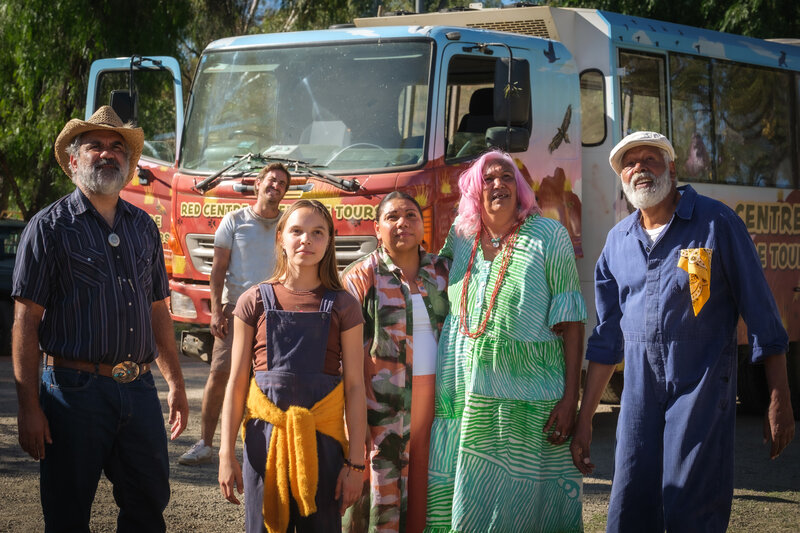After something of a misstep with the uneven Thor: Love and Thunder, director Taika Waititi returns to the kind of gentle humour that has marked his career with Next Goal Wins. If you like early Taika – Eagle vs Shark, or Flight of the Conchords, for example – you’ll likely warm to this rollicking underdog story.
The film opens with a defining moment in international football (soccer, for the uninitiated). In 2001, Australia’s Socceroos set a still-standing record in a senior men’s international by beating American Samoa 31 – 0. Unsurprisingly, a loss of that magnitude is going to hurt, and the tiny nation (whose main exports, according to the film, are tuna and NFL players) faced a long re-build. Actually, maybe that should be “build” because by 2011 – some 23 years after their official debut – they still hadn’t scored a goal in FIFA competitions; much less won a match. But that year, they acquired Thomas Rongen (recently sacked coach of the US Men’s Under-20 team) as manager.

In Next Goal Wins, Rongen is played by Michael Fassbender. He arrives in Pago Pago following a period of personal upheaval and professional shame. The head of the local football federation, Tavita (Oscar Kightley) is a lovely man whose aims are… modest. All he wants from Thomas is for American Samoa to score a goal. Winning or losing doesn’t matter – just one goal. With four weeks till the opening qualifier of the Oceania region, that doesn’t seem too tall an order – until he meets the team. They’re all amateurs who work multiple jobs and struggle with even the basics of the game. Their strikers can’t get a shot on target (even from the penalty spot), their defence is disorganised, and their goalkeeper Pisa (Lehi Falepapalangi) can’t get out of his own way. Seemingly the only player with any real talent is Jaiyah Saelua (Kaimana), a fa’afafine (third gender) player who is transitioning. But Jaiyah is unreliable, and this rankles Rongen who had played at a high level in both his native Netherlands and in the USA. Suddenly, the idea of even scoring a single goal seems like a pipe dream.
This particular story has been told before – in the 2014 documentary also called Next Goal Wins. Waititi and co-screenwriter Iain Morris fictionalise enough to take it out of documentary territory, while retaining the core of the story. However the overall dramatic arc will be familiar to pretty much everyone. The trope of a plucky band of misfits overcoming the odds to realise some dream stretches back to the silent era. Here,Waititi doesn’t shy away from the trope – in fact he leans into it. So the outcome won’t come as a surprise. The sub-plot involving Rongen as both a fish-out-of-water and a damaged man looking for some sort of salvation also treads a familiar path. Mistakes will be made, but lessons will be learned – not all of them on the football pitch.
But what slightly elevates this film is the warmth and humour Waititi and Morris create. The infusion of a Samoan sensibility (even though the film was mainly shot in Hawaii) to the characters and the plot helps bring both to life. Waititi brings the kind of understated comedy that has – at least until recently – been his trademark. Much of that is conveyed through the character of Tavita, the man with a foot in both “camps” of football hierarchy and Samoan culture. He includes scenes showing how the Samoan way of life impacts Rongen’s task. These are played for humour but without being demeaning. I did enjoy the rather unorthodox way that Waititi relates the outcome of the crucial game at the climax of the movie.
In other hands, this film would have been a sappy “white saviour” narrative. But Waititi and Morris mostly temper that perception by highlighting (though perhaps not centring) the players, particularly Jaiyah and her story. In one crucial scene, Jaiyah shows Rongen that her struggles are just as important than hers; and that hers go beyond a mere game of football. During the credits, Waititi includes footage showing what happened to the real-life characters portrayed in the film, and Jaiyah’s is certainly the most inspiring. Indeed, the ending inspired applause at the screening I attended.
Michael Fassbender (The Killer) is clearly the biggest name in the cast, but his character is the hardest to like. Even when revelations emerge about his past, it’s difficult to warm to him as a person. Still, Fassbender does what he can with the material, even if he perhaps overdoes the coach’s explosive temper. Kaimana brings a warmth and energy to Jaiyah. Waititi himself turns up as a Samoan priest who serves as a kind of Greek chorus. Elisabeth Moss appears as Rongen’s ex-wife Gail, while Will Arnett pops up as her new partner. Aussies Angus Sampson and Luke Hemsworth get brief cameos. But for me, the film belongs to Oscar Kightley (The Breaker Upperers) who brings a ton of charm as the unflappable Tavita.
Next Goal Wins isn’t a world-beater of a film. But like its subjects, it perhaps competes above its weight. While it never breaks out of its genre expectations, it delivers enough tweaks to make it enjoyable.
David Edwards
Other reviews you might enjoy:

David Edwards is the former editor of The Blurb and a contributor on film and television





